The Evolution of The Office
When the American version of The Office debuted as a six-episode midseason replacement in 2005, it did so to a distinctly lukewarm reaction. It was seen as little more than a poor-man’s version of the Gervais original, an uninspired clone that - in its first episode or two at least - did little to mark itself out as a distinctive comedy proposition in its own right.
It didn’t take long, however, for that to change - and four and a half years later, we see the show about to launch its sixth season next month. It enjoys strong ratings (which climbed over the course of the first four seasons, dipping only marginally for the fifth), tremendous critical acclaim on a level almost comparable to Arrested Development and Curb Your Enthusiasm, and has picked up a slew of awards while making bona fide stars out of a number of its cast - and none of this shows any sign of abating.
So what changed? How did The Office go from lacklustre beginnings to become one of the top American comedy shows of the last decade? And is it possible to argue that it’s actually grown to a point that it overshadows its original UK counterpart?
“Once every hour, someone is involved in an internet scam. That man is Michael Scott.”
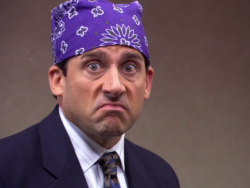 |
Arguably the biggest difference between the two shows is in the portrayal of their lead characters. While there’s no denying that David Brent is a superb comic creation, he’s limited in scope - in much the same way as (to make the obvious comparison) a Basil Fawlty. He can be tremendously funny doing one thing, but that’s about it - and if you try to develop him too much, you’ll lose what makes him funny in the first place. The Michael Scott that began season one of The Office was, predictably enough, much more Brent-ish - and even throughout episodes such as “Basketball” and “Hot Girl”, there was something cringey and not hugely likeable about his behaviour.
But something changed when season two got underway, and it’s been the crux of making the show more successful as a long-term proposition. And it’s this - Michael became likeable. Not entirely, of course - there’d be no comedy, or even show, left if he was an outright sympathetic hero - he’s still insensitive, and can be downright cruel at times (especially when it comes to Toby), while his moments of stupidity remain monumental (“Wikipedia is the best thing ever. Anyone in the world can write anything on any subject… so you know you’re getting the best possible information”). But these are the flaws that make him human, rather than sole, defining traits that make him a Brent-esque monster - because we also see his childlike glee at so many aspects of life (his trips to “magic camp”, his money spent on Muppet Show boxsets, his wish-fulfilment movie script, the reason why he managed to cook his foot). His relationship with Jan, while it began to border on cartoonish in the first half of season four, helped to round him as a character - and began, lest we forget, with a demonstration of something we never saw from his UK counterpart: he can be good at his job. He may not be the best manager, but it’s clear why he’s there - because he can be a likeable and charismatic salesman. And not having to suspend disbelief at how someone so apparently incompetent could have risen to his position may not seem the most important aspect of the show, but it’s nevertheless a good platform on which to build.
It’s undeniable that the reason for the widening of Michael’s scope as a character (and as a comedic vessel) lies in the ability of Steve Carell - also indisputably the show’s strongest asset. You don’t put a comic actor of such magnificent talent in a series and expect them to play a one-dimensional antagonist. Carell is capable of a wide range of comedy, and whether through physical comedy, his delivery of Michael’s wide-eyed (and ultimately, far more innocent than Brent) assertions to camera, or his expressions, he’s never anything less than supremely funny. He may have seemed a little uncomfortable delivering Gervais and Merchant-series dialogue in the pilot episode, but since the writing began to be tailored to him - and he’s consistently excellent throughout that first season, too, so let’s not pretend it only became any good with “The Dundies” - it’s made Michael one of the most memorable TV characters of recent years.
“I’m going to Thailand with some friends from high school. Well, a high school.”
Given that there are usually twenty-odd episodes in a season of The Office (give or take Writers’ Strike-enforced truncation), it’s clear that the show needed to find ways to make itself sustainable over a much longer period than the UK show would ever have contemplated. As brilliant as Carell is, he can’t carry the show alone - and nor can the burden be shifted solely on to Dwight, Jim, Pam and Ryan, the characters brought directly across (with name changes) from the original. In giving the show a viable set of supporting characters, the writers have been able to work more material into the longer running time. The likes of Oscar, Kevin, Stanley, Meredith and Phyllis never take centre stage - even in episodes supposedly about them, such as “Phyllis’ Wedding”, most of the material is built around Michael - but they’re crucial in providing subplots, running gags and just generally good comic material. It’s not a bad variety of characters, either, considering that only Kevin had any real basis in the original series.
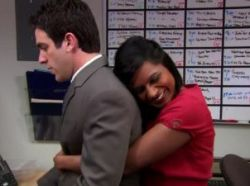 |
Probably the biggest role given to an entirely original character is that of Kelly, and she - and her tempestuous relationship with Ryan - has provided some of the show’s funniest material, as the character has gone from a fairly ordinary background face in her first appearance, to being moulded more around writer/actress Mindy Kaling’s supreme ability at playing a bitchy yet loveable airhead. Ryan himself, meanwhile, represents by far the biggest deviation from a UK equivalent character - and his rise and fall from temp, to salesman, to corporate hotshot, to convicted criminal, to bowling alley staff, to temp again, has been an absolute joy. It can be no coincidence that these two characters are played by two of the show’s most influential writer/producers.
The need to expand the show extends beyond just adding characters at the start, too - as the show’s gone on, its scope has been widened, and as we’ve been introduced to new locations, so too have we met new characters. Jim’s move to Stamford, the trips to the Corporate offices, the increased screentime given to the warehouse… all of these have seen new faces appear both for short and longer periods of time. Indeed, The Office might have one of the largest - and most constantly rotating - sitcom casts going, and yet it does an extremely good job of juggling everything. Both the first half of season three (Stamford) and the latter half of season five (the Michael Scott Paper Company) saw entire plot threads spent at other offices, and yet these slotted in seamlessly alongside the usual Scranton scenes.
Of course, adding all these characters doesn’t necessarily mean that the originals suffer. We’ve talked about Michael and Ryan (and we’ll get to Jim and Pam later), but a word quickly on Dwight - because he, too, has developed far past his original counterpart (no mean feat, of course, with Gareth offering so much of the UK version’s best material). Again, this is an example of taking the traits of the actor and playing to them - so while a fair amount is made of his volunteer sheriffing (his equivalent of Gareth’s TA membership) in earlier seasons, this takes on less importance compared with the rest of his downright weirdness: someone who enthuses about Battlestar Galactica like a standard office nerd one minute, yet runs a beet farm with his cousin (the brilliant and largely silent Mose) the next. The writers clearly have fun pushing his family background and upbringing further and further into surreality, and his monologues to camera are great for taking things to ludicrous extremes - with perhaps the best example being his “perfect crime” :
“I break in to Tiffany’s at midnight. Do I go for the vault? No. I go for the chandelier. It’s priceless. As I’m taking it down a woman catches me. She tells me to stop. It’s her father’s business. She’s Tiffany. I say no. We make love all night. In the morning the cops come and I escape in one of their uniforms. I tell her to meet me in Mexico, but I go to Canada. I don’t trust her. Besides, I like the cold. Thirty years later, I get a postcard: I have a son, and it’s the chief of police. This is where the story gets interesting. I tell Tiffany to meet me in Paris by the Trocadero. She’s been waiting for me all these years. She’s never taken another lover. I don’t care. I don’t show up. I go to Berlin. That’s where I stashed the chandelier.”
“Oompa Loompa, Doopity Dawesome / Dwight is now gone, which is totally awesome.”
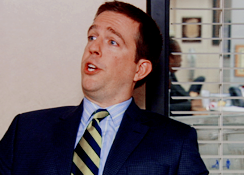 |
Of the assorted characters that have been added to the show’s roster over five seasons, though, none has made more of an impact than the last member of the Stamford staff to survive the branch merger, Andy Bernard. Ed Helms has made such an impact on the show that going back and watching episodes from season two - as brilliant as that season is - feels strange, simply because he’s not around. He’s a third spoke to the Jim and Dwight dynamic - in that he annoys both of them in equal measure - and yet, like Michael, having started out as just plain unlikeable, he’s managed to attract increasing levels of sympathy even while still acting like a complete tool. Of course, this is more traceable to a specific incident - having got comeuppance for his obnoxious behaviour upon moving to Scranton, he returns from his time in anger management somewhat changed, and far less eager to antagonise.
It’s possible to argue, of course, that Andy represents the final step away from the original style of the UK series - he’s simply too cartoonish a character, with his speech patterns, his nicknames, his endless (and hilarious) singing and so on. He’s a very American style of sitcom character. But what can’t be denied is that he’s very, very funny. As with Michael and Carell, this owes as much to Helms’ ability as it does to the way the character’s written. Andy works, because Helms plays him entirely straight - there are occasions when Andy looks for the laugh, it’s true, but even then we laugh at him rather than with him. When he’s at his best, though, it’s because of a certain level of guileless innocence - witness his atonal (and joyous) singing of “Lovefool”, or his musing on his inability as a movie critic (“Maybe I could be a food critic. ‘These muffins… taste bad!’ Or an art critic. ‘This painting… is bad!’”) Indeed, it occurs that in all these ways, he’s actually quite a surprisingly close parallel to Michael - perhaps more of a proto-Michael, less far along the line but still showing recognisable traits.
“Sometimes I send Dwight faxes. From himself. From the future.”
Of course, Andy is representative of the fact that the US version demonstrates a wider variety of types of humour than its predecessor. In early episodes, for example, the characteristic “comedy of embarrassment” was naturally at the fore - but this aspect has softened as time has gone on. But the broadening of the show’s humour needn’t necessarily be seen as a negative thing when it’s so bloody funny - and it’s also enabled some comedic threads that existed in the original to be taken and expanded upon to greater, and generally more amusing, proportions. Most obviously, Jim’s pranks on Dwight have been developed to somewhat unrealistic - but devastatingly funny - extremes. Whether dressing up as (and imitating) his nemesis (to be fair, Dwight got his own back in excellent fashion on that one… “Uh, a little comment”), putting his belongings in the vending machine, replacing his desk and chair with empty Christmas wrapping, sending him on fake CIA reconaissance or simply sending faxes from “Future Dwight”, it’s hard to pick a favourite - but they’re never less than brilliant.
“This is far from shallow. This is… emotionally magnificent.”
With all those episodes to fill, The Office is naturally far more reliant on story than its UK equivalent - which only really skirted towards the plot threads of Brent’s downfall and Tim and Dawn’s relationship up until a Christmas special that was then concerned with giving viewers some emotional closure. I mentioned earlier the widening of scope that’s been seen, and that’s allowed for a number of plotlines both short and multiple season-spanning. No-one could have predicted in the early days, for example, the twists and turns (or indeed, come to that, the existence) of Dwight and Angela’s relationship; and even less so the various women in Michael’s life. And of course, we’ve followed people’s changing career path - Jim’s move to Stamford and back, Ryan’s aforementioned rise and fall, and the shock of Michael leaving suddenly in season five and actually going through with his plan to start his own paper company. Individual episodes, too, often have individual plots rather than merely the loose themes of so many of the British version’s installments.
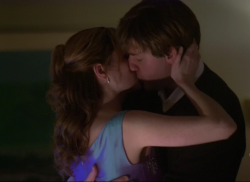 |
Indeed, it’s often the case that the show worth watching as much for having an interest in the ongoing storylines as it is for the comedy. Nowhere is this more evident than in the show’s central plotline and relationship, that of Jim and Pam. Recognising that a long-running, continuous show couldn’t have the relationship follow the same path as Tim and Dawn - endless reticent circling around one-another before an eventual happy ending - there have instead been twists and turns that usually never fail to keep the audience on tenterhooks. If anything, Jim in particular has seen his comedic focus dwindle as the likes of Andy have stepped in to steal the show; and his best moments are usually the next heart-melting twist in their saga. His sudden and entirely unexpected declaration of love at the end of season two’s finale “Casino Night” really kick-started the trend, and since then we’ve had his move away and return followed by his relationship with Karen (and, in a further twist, Karen actually turned out to be kind of great herself, so we couldn’t be too unhappy about Jim being with her), while Pam briefly reunited with Roy. Season four finally saw the two get together, in a move that could well have ruined the dynamic of the show - but somehow didn’t, as they were so utterly adorable that there was still mileage to be had. Even now, as they’ve settled firmly into a solid, long-term relationship (moreso after the brilliant - and again unexpected - moment of Jim’s season five proposal), there are left-field turns, culminating in season five’s cliffhanger. It’s genuinely one of TV’s most enthralling relationships, and the hope is only that it doesn’t go down the Friends route of becoming unbearably tedious about the whole thing. The fact that we’ve had two whole seasons of them as a couple without it being ruined is a positive sign, but it remains to be seen how well this will continue in season six.
“I’m not superstitious… but I am a little stitious.”
All of this shows, really, that it’s pointless trying to directly compare the two shows - the very nature of the contrasting formats means that the US version is essentially an entirely different series, even abandoning the slavishly copied directorial style of the early episodes for a style that, while still maintaining the loose veneer of a “docusoap” format, is much quicker-paced and more rooted in sitcom tradition. By the same token, though, as can be clearly seen, The Office US-style has carved out a distinctive niche all of its own, and developed into a genuinely great series in its own right. The slight (and I do mean slight) dips in quality through some of the fourth and fifth series notwithstanding, the prospects for its future remain bright, and it also stands up incredibly well to rewatching. And although I’ve pointed out that a direct comparison is largely useless, I must admit to a sneaking preference for the remake.
“The only difference between me and a homeless man is this job. I will do whatever it takes to survive. Just like I did… when I was a homeless man.”
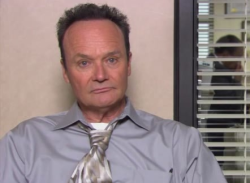 |
But that’s probably also because the American version has Creed in it.
About this entry
- By Seb Patrick
- Posted on Thursday, August 13 2009 @ 10:56 pm
- Categorised in TV, Analysis
- Tagged with the office
- 6 comments

‘It is your birthday’
Great article Seb!
By Joey
August 14, 2009 @ 8:49 am
reply / #
Just excellent. Good stuff, Seb - though, since I’m only catching up with the show on DVD, I’ve spoilt myself rotten reading it. But I couldn’t let it go unfinished.
There’s no denying that, to sustain its run, the American show has had to become a little more ‘formatted’. There are an awful lot of ‘X days’ - awards, courses, deadlines, parties - and there are a lot more straightforward set-up/punchline gags. But they’re sooooo good.
It’s interesting that the secondary cast comes, in significant part, from writer-actors. Arguably it’s why they arrive so cleanly - usually you’ll write ‘guy at bar’, and if he gets a laugh you bring him back a few weeks later until, three series on, he’s a semi-regular with a newly-created history; whereas here it feels like, presumably because co-writers are investing in them in order to play them, there’s already untapped history in place when they first show up.
For me most impressive bit of writing for me in the whole of the UK series was Brent’s final date in the Christmas special. It’s not that it ‘goes well’, it’s that you can clearly see why. That, in the right company, Brent becomes a better person. Which is utterly true in life, I think, and was communicated brilliantly on-screen.
Which has nothing to do with a comparison to the US show. It’s just interesting. To me.
By Andrew
August 14, 2009 @ 3:24 pm
reply / #
since I’m only catching up with the show on DVD, I’ve spoilt myself rotten reading it.
Gah, sorry - I did ponder whether to warn about spoilers, but figured it would be quite obvious from the title that I was going to be talking about the series as a whole… where are you up to with the DVDs?
Glad you enjoyed it, though!
By Seb Patrick
August 14, 2009 @ 9:40 pm
reply / #
Not the article’s fault - beyond ‘by being interesting’ - at all. You just never know how general or specific these things are gonna be. After the first mention of season four developments (DVDs in the UK are only up to three) I could have ducked out, knowing it was going to be that detailed.
I just didn’t want to.
By Andrew
August 14, 2009 @ 10:48 pm
reply / #
Andrew: http://www.rixstuff.net/
By Pete
August 15, 2009 @ 11:16 am
reply / #
After dismissing the US show since it’s start as a cheap rip-off of the UK version, I finally knuckled down and actually watched it earlier this summer. This article is fantastic, and perfectly mirrors my personal reflections on the differences between the two series. I particularly enjoyed the comparison of David Brent and Michael Scott.
In fact after watching the US version, I rewatched the UK version, and was shocked to recall just how unlikeable Brent really is.
By SatNav
August 30, 2009 @ 10:56 pm
reply / #